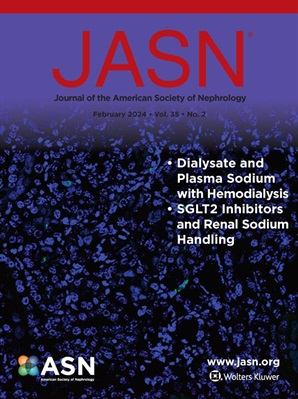内皮祖细胞:肾病的疾病标志物和潜在治疗方法。
IF 10.3
1区 医学
Q1 UROLOGY & NEPHROLOGY
引用次数: 0
摘要
内皮祖细胞(Endothelial progenitor cells, EPCs)是再生医学研究的热点之一。这些细胞来源于骨髓和其他循环的造血细胞,并调节组织再生和血管完整性。内皮祖细胞的动员有助于多器官系统损伤后的新生血管和再内皮化,包括肾脏和心血管系统。它们的数量和功能在慢性肾病等疾病状态下可能会有所不同,这取决于严重程度、合并症和其他因素。因此,循环EPC计数和功能被认为是血管健康的标志,它们的动员或补充可能提供潜在的治疗。在慢性和急性肾损伤动物模型中,EPC的递送已显示出修复损伤肾脏的成功。这种方法可能受到EPC异质性和不完整特征的限制,可以通过标准化、工程化或与其他疗法联合来解决。本文旨在回顾EPC在肾脏疾病中可能导致其失调的稳态和条件中的作用的现状和最新进展。本文章由计算机程序翻译,如有差异,请以英文原文为准。
Endothelial Progenitor Cells: Disease Markers and Potential Therapy in Kidney Disease.
Endothelial progenitor cells (EPCs) constitute a promising focus for research in regenerative medicine. These cells originate from the bone marrow and other circulating hematopoietic cells and regulate tissue regeneration and vascular integrity. EPCs mobilization serves for neovascularization and reendothelialization after injury in multiple organ systems, including the renal and cardiovascular systems. Both their number and function may vary in disease states like chronic kidney disease, depending on severity, comorbid conditions, and other factors. Therefore, circulating EPC count and function have been proposed as markers for vascular health, and their mobilization or replenishment may offer a potential therapy. Delivery of EPC has shown success in repairing injured kidneys in animal models of both chronic and acute kidney injury. This approach may be limited by EPC heterogeneity and incomplete characterization that may be addressed by standardization, engineering, or combination with other therapies. This article aims to review the current state and recent advances in our understanding of the role of EPC in homeostasis and conditions that may lead to their dysregulation in kidney diseases.
求助全文
通过发布文献求助,成功后即可免费获取论文全文。
去求助
来源期刊
CiteScore
22.40
自引率
2.90%
发文量
492
审稿时长
3-8 weeks
期刊介绍:
The Journal of the American Society of Nephrology (JASN) stands as the preeminent kidney journal globally, offering an exceptional synthesis of cutting-edge basic research, clinical epidemiology, meta-analysis, and relevant editorial content. Representing a comprehensive resource, JASN encompasses clinical research, editorials distilling key findings, perspectives, and timely reviews.
Editorials are skillfully crafted to elucidate the essential insights of the parent article, while JASN actively encourages the submission of Letters to the Editor discussing recently published articles. The reviews featured in JASN are consistently erudite and comprehensive, providing thorough coverage of respective fields. Since its inception in July 1990, JASN has been a monthly publication.
JASN publishes original research reports and editorial content across a spectrum of basic and clinical science relevant to the broad discipline of nephrology. Topics covered include renal cell biology, developmental biology of the kidney, genetics of kidney disease, cell and transport physiology, hemodynamics and vascular regulation, mechanisms of blood pressure regulation, renal immunology, kidney pathology, pathophysiology of kidney diseases, nephrolithiasis, clinical nephrology (including dialysis and transplantation), and hypertension. Furthermore, articles addressing healthcare policy and care delivery issues relevant to nephrology are warmly welcomed.

 求助内容:
求助内容: 应助结果提醒方式:
应助结果提醒方式:


